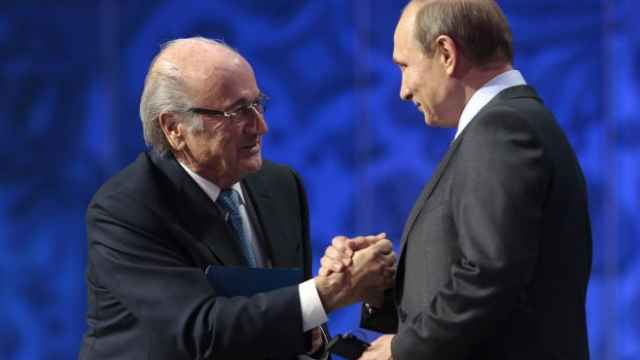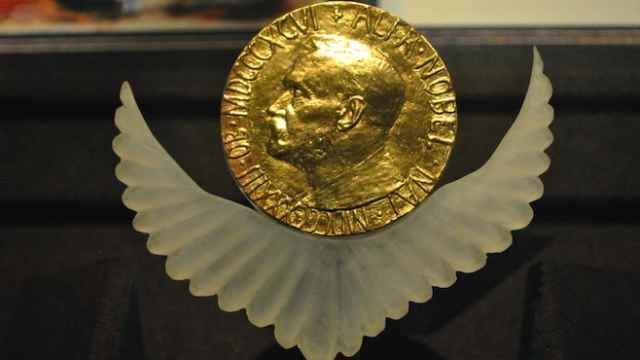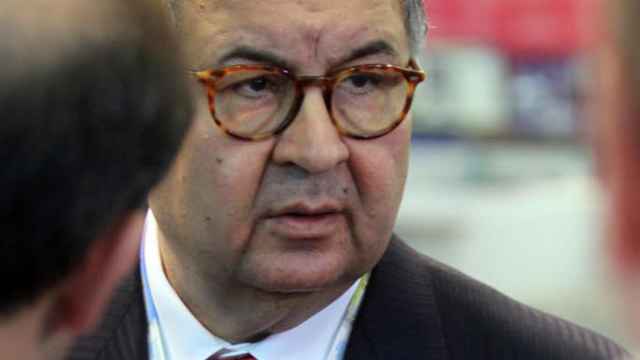The Swedish Academy cited the 67-year-old journalist and prose writer "for her polyphonic writings, a monument to suffering and courage in our time."
Alexievich, the 14th woman to win the literature award since 1901, used the skills of a journalist to create literature chronicling World War II, the Soviet war in Afghanistan, the 1986 Chernobyl nuclear disaster, and social problems like attempted suicides after the Soviet Union disintegrated.
The academy's permanent secretary, Sara Danius, praised Alexievich as a great and innovative writer who has "mapped the soul" of the Soviet and post-Soviet people.
"She is offering us new and interesting historical material and she has developed a particular writing style, as well as a new literary genre," Danius told The Associated Press. "She has said many times that 'I'm not interested in events, the history of events, I'm interested in the history of emotions' and that's kept her busy for the past 40 years."
Like many intellectuals in Belarus, Alexievich supports the political opponents of authoritarian President Alexander Lukashenko, who is up for re-election on Sunday. Because of her criticism of the government she has periodically lived abroad — including in Italy, France, Germany and Sweden — but now lives in Minsk, the Belarussian capital.
Alexievich told The AP she had not yet received any congratulations from the president, whom she has pithily criticized for years.
"It'd be interesting to see what he's going to do in the situation," she said, speaking on the landing outside her apartment in a Soviet-era block.
Alexievich said she was at home "doing the ironing" when the academy called with the news and that she felt "joy and anxiety at the same time: How am I going to keep this up?"
Her first book, "War's Unwomanly Face," published in 1985, was based on the previously untold stories of women who had fought against Nazi Germany. It sold more than 2 million copies.
Her books have been published in 19 countries, with at least five of them translated into English. She also has written three plays and the screenplays for 21 documentary films.
Speaking to Swedish broadcaster SVT, Alexievich said winning the award left her with "complicated" emotions.
"It immediately evokes such great names as [Ivan] Bunin, [Boris] Pasternak," she said, referring to Russian writers who have won the Nobel Prize for literature. "On the one hand, it's such a fantastic feeling. But it's also a bit disturbing."
Asked what she was going to do with the 8 million Swedish kronor (about $960,000) in prize money, she said it would allow her to write more.
"I do only one thing: I buy freedom for myself. It takes me a long time to write my books, from five to 10 years," she said. "I have two ideas for new books, so I'm pleased that I will now have the freedom to work on them."
Born on May 31, 1948, in the western Ukrainian town of Ivano-Frankvisk to two village schoolteachers, Alexievich studied journalism in Belarus, which at the time was part of the Soviet Union. She worked at newspapers near the Polish border and in Minsk while collecting material for her books.
In 1989, she published "Zinky Boys: Soviet Voices from the Afghanistan War," a book about the war that had been concealed from the Soviet public for 10 years.
Her 1993 book "Enchanted with Death" focused on attempted suicides resulting from the downfall of communism, as people who felt inseparable from socialist ideals were unable to accept a new world order.
In 1997, Alexievich published "Voices from Chernobyl: Chronicle of the Future." The book, which was released in English two years later, is not so much about the nuclear disaster as it was about the world after it: how people adapt to a new reality, living as if they had survived a nuclear war.
The Swedish Academy insists its selections are based on literary merit alone. But its decisions have often sparked political reactions, particularly during the Cold War.
The first Soviet citizen to win the literature prize was Pasternak in 1958, but Soviet authorities denounced him and refused to let him go to Stockholm to collect the award.
Soviet dissident Aleksandr Solzhenitsyn didn't go to Stockholm either after he won the Nobel literature prize in 1970, fearing that Soviet authorities wouldn't let him back in. He accepted the award four years later after he was exiled from the Soviet Union.
The Nobel academy has also honored writers who were viewed favorably by Soviet leaders, including Mikhail Sholokhov in 1965.
This year's Nobel announcements continue with the Nobel Peace Prize on Friday and the economics award on Monday. The awards in medicine, physics and chemistry were announced earlier this week.
All awards will be handed out on Dec. 10, the anniversary of prize founder Alfred Nobel's death in 1896.
A Message from The Moscow Times:
Dear readers,
We are facing unprecedented challenges. Russia's Prosecutor General's Office has designated The Moscow Times as an "undesirable" organization, criminalizing our work and putting our staff at risk of prosecution. This follows our earlier unjust labeling as a "foreign agent."
These actions are direct attempts to silence independent journalism in Russia. The authorities claim our work "discredits the decisions of the Russian leadership." We see things differently: we strive to provide accurate, unbiased reporting on Russia.
We, the journalists of The Moscow Times, refuse to be silenced. But to continue our work, we need your help.
Your support, no matter how small, makes a world of difference. If you can, please support us monthly starting from just $2. It's quick to set up, and every contribution makes a significant impact.
By supporting The Moscow Times, you're defending open, independent journalism in the face of repression. Thank you for standing with us.
Remind me later.





